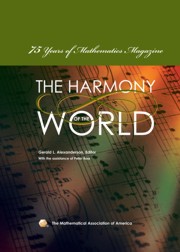Book contents
- Frontmatter
- Introduction
- Contents
- A Brief History of Mathematics Magazine
- Part I The First Fifteen Years
- Part II The 1940s
- Part III The 1950s
- The Harmony of the World
- What Mathematics Has Meant to Me
- Mathematics and Mathematicians from Abel to Zermelo
- Inequalities
- A Number System with an Irrational Base
- Part IV The 1960s
- Part V The 1970s
- Part VI The 1980s
- Briefly Noted
- The Problem Section
- Index
- About the Editors
Mathematics and Mathematicians from Abel to Zermelo
from Part III - The 1950s
- Frontmatter
- Introduction
- Contents
- A Brief History of Mathematics Magazine
- Part I The First Fifteen Years
- Part II The 1940s
- Part III The 1950s
- The Harmony of the World
- What Mathematics Has Meant to Me
- Mathematics and Mathematicians from Abel to Zermelo
- Inequalities
- A Number System with an Irrational Base
- Part IV The 1960s
- Part V The 1970s
- Part VI The 1980s
- Briefly Noted
- The Problem Section
- Index
- About the Editors
Summary
Editors' Note: Here one of the foremost twentieth century researchers in analysis, Einar Hille of Yale University, tries his hand at a historical overview of largely nineteenth century mathematics. Much of the material will be known to mathematical history buffs, but Hille has some interesting observations, insights, and stories that make this a worth-while piece.
Though born to Swedish parents in New York in 1894, he returned with his mother to Sweden when he was two and received his education there, earning his PhD from the University of Stockholm in 1918. After appointments at Harvard and Princeton, he went to Yale where he remained until retirement. He married the sister of the eminent Norwegian number theorist, Øystein Øre, who was also a professor of mathematics at Yale and a biographer of Abel.
Hille was described as being “almost unique among mathematicians in applying functional analysis to investigate classical problems, rather than simply considering abstract situations for their own sake.” (Reference [9] at the MacTutor website.) Hille himself said in the preface to his book, Methods in Classical and Functional Analysis (Addison-Wesley, 1972), “If the book has a thesis, it is that a functional analyst is an analyst, first and foremost, and not a degenerate species of a topologist. His problems come from analysis and his results should throw light on analysis … It seemed to me that I could do some useful work in giving the student a historical perspective and in showing how the multitude of abstract concepts have arisen and are present in Euclidean spaces.”
- Type
- Chapter
- Information
- Harmony of the World75 Years of Mathematics Magazine, pp. 81 - 94Publisher: Mathematical Association of AmericaPrint publication year: 2007

